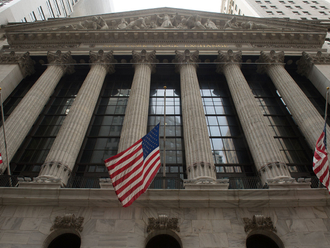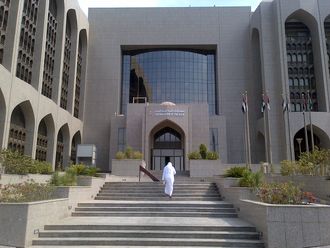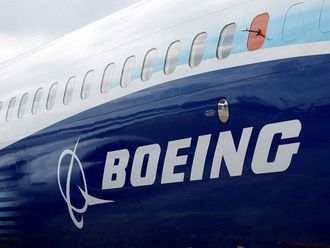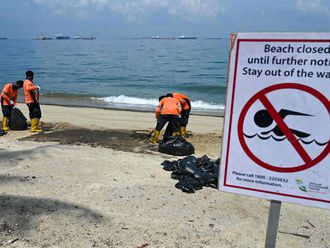
Dubai: Syndicated loans in the Middle East and North Africa (Mena) region have plunged to the lowest level since 2004 as international lenders reduced participation because of the Arab uprisings and falling yields encouraged companies to sell bonds.
Banks arranged about $10.6 billion (Dh38.9 billion) in syndicated loans this year, 56 per cent less than a year earlier, according to data compiled by Bloomberg. HSBC Holdings underwrote $622 million compared with $1.82 billion last year and Standard Chartered $369 million compared with $1.74 billion, the data show. The banks surrendered the top two places in the list of the biggest syndicated loan arrangers to Egyptian state-owned lenders the National Bank of Egypt and Banque Misr.
"The heightened geopolitical risk in the region is making syndication difficult, as international banks won't participate," Emmad Mostaque, a Mena strategist at Religare Capital Markets in London, said in an e-mailed response to questions yesterday.
The number of local banks in the list of the top-20 arrangers of syndicated loans doubled to ten this year, according to Bloomberg data. Popular uprisings sweeping the region toppled the Tunisian and Egyptian leaders in January and February.
While syndicated loans have tumbled, a push by companies to extend debt maturities and diversify sources of borrowings may see bond issuance beat last year's $40 billion, according to Deutsche Bank AG.
Yields fell to 5.03 per cent on June 10, the lowest level since November 11, 2010, from a nine-month high of 5.97 per cent on March 18, 2010, according to the HSBC/Nasdaq Dubai Middle East Conventional US Dollar Bond Index that tracks 105 securities in the region. The rates were at 5.29 per cent yesterday.
Top regional borrowers
Private and state-owned companies in the region raised $62 billion in syndicated loans last year, Bloomberg data show. The top-two borrowers in last year's period were Abu Dhabi's state-owned International Petroleum Investment Co (Ipic), which raised about $5.58 billion and Mubadala Development Co. PJSC, which raised $2.5 billion.
Both companies sold bonds this year. Ipic's was the biggest issue of bonds in the Gulf this year raising $4.36 billion, Bloomberg data showed.
Mubadala sold $1.5 billion of bonds in April priced to yield 210 basis points, or 2.1 percentage points, over Treasuries and may return to the market this year. The government-owned investor with stakes in Carlyle Group and General Electric Co., may sell debt to finance projects, Ali Najafbagy, head of capital markets at the company, said in May.
Majid Al Futtaim Holding LLC, the Dubai-based regional operator of Carrefour supermarkets, may sell five-year bonds to fund expansion and extend debt maturities.
Loan-heavy
"The mix of bonds versus loans that corporates in this region use to fund themselves is very loan-heavy compared to global markets," said Abdul Qader Hussain, who helps oversee $2 billion in fixed-income assets as chief executive officer at Mashreq Capital DIFC Ltd. in Dubai.
"That trend will change and companies like Majid Al Futtaim will look to diversify their funding base in terms of sourcing and maturities," he added.
The revolts that began in Tunisia reached countries including Libya. Protests also spread to Bahrain, Syria and Yemen. The drop in syndicated loans was in part because "the political situation has impacted the ability of some lenders to get access to funds", said Steve Perry, regional head of loan syndication at Standard Chartered. "There have been a number of deals closed away from the public domain either as bi-lateral financings or via small club deals, but the bulk of the financings thus far have been re-financings.
Trend to continue
"We expect this trend to continue for the remainder of this year." Perry said.
Bond sales have also declined, though less than syndicated loans. Borrowers in the region raised about $11.2 billion in bonds through 21 securities this year, 9.6 per cent less than in the same period a year earlier, data compiled by Bloomberg show. HSBC Holdings retained its position as the main adviser for bond sales this year.
"International bonds from the region were subdued for a certain period of time due to the Arab Spring," Salman Al Khalifa, the Dubai-based regional head of markets at Deutsche Bank AG told reporters on June 14. "That doesn't take away from the general trend that people's financing requirements and needs around borrowing are continuing to increase due to rising economic activity."
First-quarter sale
Al Khaliji, a Qatari bank, will seek a credit rating this year and may issue bonds by the first quarter, acting chief executive officer Robin McCall said on June 8. Dolphin Energy Ltd., an Abu Dhabi government-controlled venture transporting natural gas, hired banks to arrange investor meetings for a potential sale of bonds not exceeding $1.93 billion, according to a person familiar with the transaction.
Tourism Development and Investment Co., an Abu Dhabi-backed developer of hotels and museums, may sell bonds maturing in seven to 10 years, Finance Director Wallace Long said in April. The company has the ability to sell $3 billion of debt and may come to market in the next nine months, he said.
"Abu Dhabi has been leading the way in issuance," said Mostaque of Religare Capital Markets
Egypt has shied away from the bond market this year after the revolt that toppled President Hosni Mubarak raised government domestic borrowing costs to the highest level since 2008, Bloomberg data revealad.
The yield on Egypt's 5.75 per cent dollar bond maturing in April 2020 has plunged about 140 basis points from its peak at 7.07 per cent on January 31. Egyptian borrowers raised about $2.6 billion in H1 2010.








_resources1_16a30b3eac4_small.jpg)



